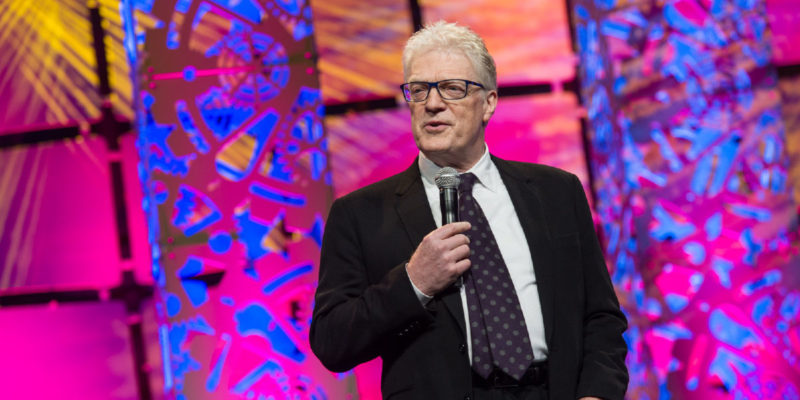
Where Passion Meets Talent
We are living in an educational revolution, noted author, adviser, and researcher Sir Kenneth Robinson, and institutions need to act quickly to ensure that students’ experiences lead to personal fulfillment while preparing individuals for the demands of the 21st century.
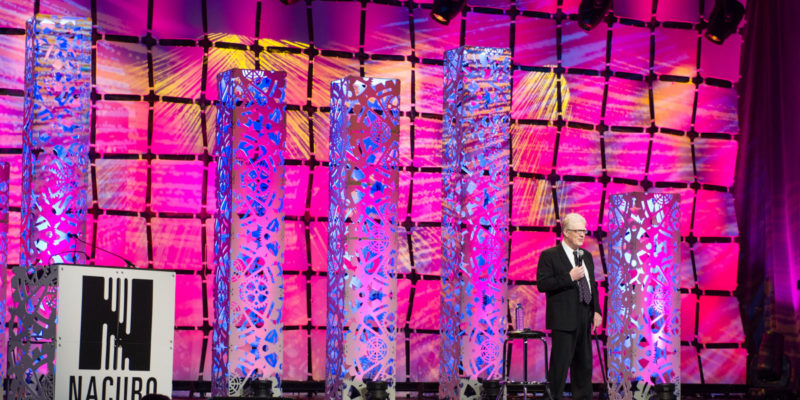
It’s time to think about how to reform our colleges and universities, and to identify ways to work with K–12 schools to better help students,” said Sir Ken Robinson, in his opening remarks to the conference’s first general session.
Robinson, education adviser, researcher, and author of Creative Schools (Penguin Books, 2015), went on to say that we are living in a time of seismic change. Students need to pursue their talents, but many don’t know what those talents and abilities might be—and the education curriculum doesn’t do a good job of facilitating self-discovery. “Human talent is like a natural resource; it’s deep and rich, but it has to be discovered and then cultivated. At the higher education level,” said Robinson, “there should be focus on collaboration and diversity, because this will help students find and tap into their talents. But, while we’re on the foothills of information technology transformation—which thrives on creativity—we are focusing on standardization instead.”
Heading in the Wrong Direction
While the Department of Education’s No Child Left Behind Act was developed for students in K–12 and intended to ultimately help students transition to higher education, the program focuses heavily on such standardized testing, yet, said Robinson, “results have not improved. We are still at a point where 25 to 30 percent of students don’t even finish high school.” The pressure to score well on these tests is a major obstacle to other essential reforms in K–12, he observed. “While more people are beginning to understand the importance of cultivating creative thinking into the education process, students enter a university having spent years in high school pressured to conform and to come up with ‘right’ answers. So, expecting students to suddenly become creative thinkers as soon as they enter the university is a bit of a stretch.”
Even so, noted Robinson, we can help students think in more creative ways through (1) more interdisciplinary work that exposes them to difference ways of thinking and (2) encouraging more innovative pedagogy that might include experimenting with flipped classrooms and with more-interactive forms of teaching and learning.
More Than One Path
As for seeking a college degree, Robinson argued that, while education is important, students shouldn’t feel forced into college. “While more students are going to college, they don’t necessarily know why they are there. And, to find other ways to succeed, students need to know their talents and how to develop them.”
Unfortunately, the system is not working as it was intended to work. Robinson pointed to a couple of reasons for that: (1) graduates are not finding jobs and are either underemployed or unemployed; and (2) academic inflation is allowing more people to earn degrees, so the value of that degree has decreased. In his view: “A degree is no longer a passport to success; it’s only a visa, because the world has changed so much.”
However, before we set out to fix the system, said Robinson, we have to figure out what education is for in order for it to change. He said the aim of education is to enable students to understand the world around them and to know their talent(s) so that they can be fulfilled individuals.
Also, he noted, many of the things that happen at our institutions are not done because of legislation, but out of habit. Luckily, habits can be changed. If we can create the world, then we can recreate it.
Education at its Core
In summary, Robinson highlighted what he considers the four core parts of education that, when delivered effectively, will result in students being equipped with the tools needed for a fulfilling and useful life:
- Economic—prepares students to be economically responsible and independent.
- Cultural—enables students to appreciate other cultures.
- Social—shapes students to be active and compassionate citizens.
- Personal—engages students in the world around them.
“It’s time for bold ideas,” concluded Robinson. “If we look at one of the most effective countries in the area of education, we see Finland going in an entirely different direction. With a youth unemployment rate of only 5 percent, the country views education as not at all about standardization, but rather about a true focus on diversity and individual creativity. The nation venerates teaching as a profession, and the educational system is based on human flourishing. Here, we have multitudes of people with many talents, but we must give our society permission to seek the kind of social change that allows us to provide the necessary resources.”
KHESIA TAYLOR is associate editor of Business Officer.
Agitate, Motivate, Educate
A prolific journalist, an unrelenting activist, and a formidable leader in education and the arts came together to share their thoughts about our nation’s culture clashes and the difficult way forward to resolve diversity issues on campus and across the country.
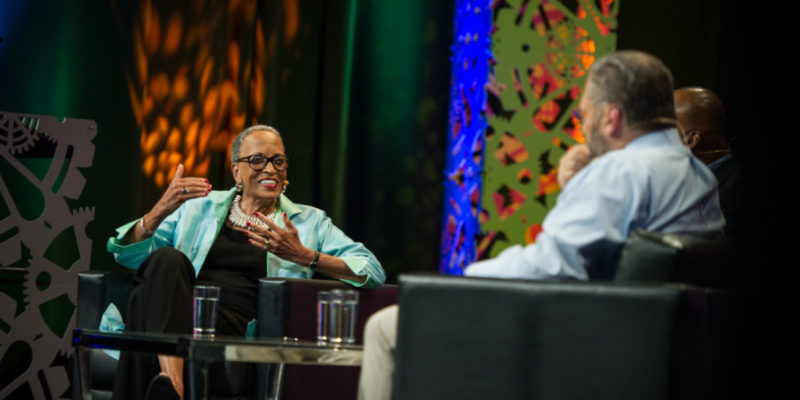
When we spoke earlier in the year about our plans for this general session discussion on diversity and inclusion,” said Ray Suarez, journalist, author, and speaker, “we had no idea just how timely the conversation would be. This country is standing on the knife’s edge, with campus unrest bubbling and many of our communities uneasy or already smoldering or recovering from destructive violence.”
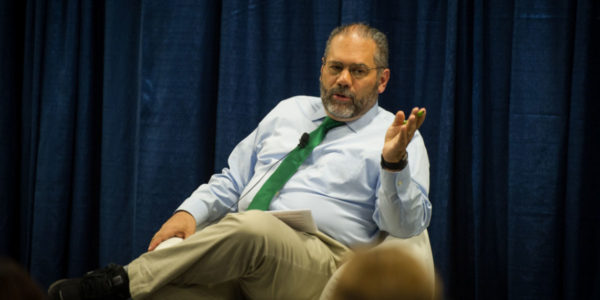
Suarez went on to introduce the two other panelists at NACUBO’s general session focused on diversity and inclusion: Bryan Stevenson, lawyer, activist, and author of Just Mercy: A Story of Justice and Redemption; and Johnnetta Cole, museum director, anthropologist, and former president of Spelman College, Atlanta, and Bennett College, Greensboro, N.C. The outspoken threesome shared their perspectives on the continuing inequalities of our culture, the seemingly insurmountable barriers to improvement, and the role of education—and educators—in influencing and facilitating a more just and level playing field.
Spotlight on Inequality
Panelists articulated strong opinions about the state of college campuses and that of larger society.
“College has always been considered a place where one engages in intellectual conversations that are both idealistic and connected with the real world—a place that allows people to soar with their unique possibilities,” said Cole. “But now, these institutions often offer little or no protection, with threats of being raped—if black, brown, or white—while we all well know that racists, homophobes, and others use unspeakable language against freshmen and others who have every right to be where they are.”
From Suarez’s point of view: “Tension and unrest continue to arise in places that were once protective but now distill the winds of the wider culture. And, you can’t hide out from what is happening.” He went on to explain that as a young Hispanic, “I was ready for a world that wasn’t ready for me. The callousness of others ended up serving me well and preparing me for the inevitable dings that will come from getting out into the world.”
Perhaps the most searing comments came from Stevenson, who said: “To be black or brown is to live in an environment of danger and guilt. It’s exhausting to be the one being perceived as a danger to society. So, when you get to campus and see no relief, it compromises your feelings of hope.”
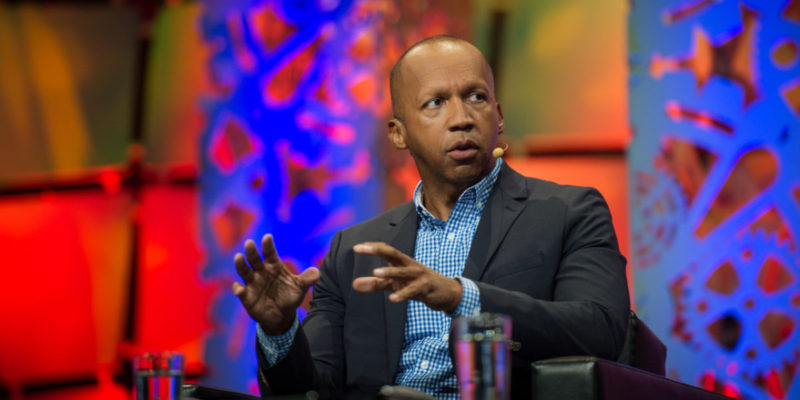
Intentional Learning
“If we are going to change,” contended Stevenson, “we need to educate a generation that will make things better. My grandmother told me that if you learn to read, it will change your life. She went into debt to buy me Dr. Seuss books—to help me imagine things that I’d never seen before. And, I would not be here speaking with you today, if my grandmother hadn’t spoken into my ear that there is nothing more honorable than having that kind of education.”
“We are continuing to teach people to be racist, homophobic—but if we more consciously focus on how we educate, we can create enormous change in our country,” noted Cole.
CAROLE SCHWEITZER is editor in chief of Business Officer.
Continued Optimism on U.S. Economy
Keynote speaker Mark Zandi remains upbeat about the state of the U.S. economy. Based on current labor market data, he believes that the nation will continue to perform well—at least until the end of 2018.
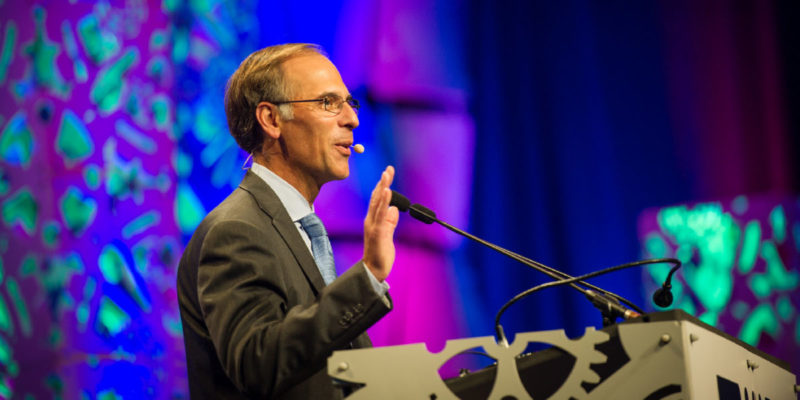
All the leading indicators of the job market look strong,” said Mark Zandi, general session speaker and chief economist of Moody’s Analytics, an independent research subsidiary of the ratings agency. Zandi, who focuses on macroeconomics, financial markets, and public policy, said that he remains optimistic about the U.S. economy because the number of open jobs is high, the quit rate has picked up, layoffs are low, and the “best economic statistic—the number of unemployment insurance claims—is as low as it gets,” he said.
Positive Developments
During the past six years, the United States has created 15 million jobs, Zandi said, calling it “quite an achievement” after the Great Recession crippled the economy 10 years ago. He predicts that if the current job growth continues, the country will soon witness full employment. Once that happens, Zandi believes that the following will take place:
- Wage growth, which has been about 2 percent, will improve. In the past 12 months, noted Zandi, salaries have increased by 2.5 to 3 percent. For a typical well-functioning economy, the wage growth should be 3.5 percent, which improves consumer spending.
- Household formation will increase. With 3.7 million more millennials living with their parents than in 2007, Zandi predicted that a stronger economy will cause millennials to strike out on their own, spurring housing and economic activity.
Global and Other Risks
While recent geopolitical events created mainly regional economic shocks, Zandi points out three potential risks:
- Interest rates will rise. A series of interest rate hikes in 2017 and 2018, because of a better performing economy in 2017–18, will result in market volatility.
- It’s an election year. If Clinton is elected president, Zandi doesn’t expect the financial markets to be affected. However, a Trump win will create volatility, because the financial markets won’t know what to expect.
- Productivity growth needs to pick up. Current growth is just 0.5 percent, and hasn’t started to climb, Zandi said. Increasing national productivity can raise living standards because more real income improves people’s ability to purchase goods and services, and housing. It also helps businesses to be more profitable. “With each passing quarter, if we don’t see an increase in productivity growth, then I am less optimistic about the economic outlook,” he said.
- The Role of Higher Education
In a message directed specifically to meeting attendees, Zandi said that colleges and universities must continue investing in students. “We need to see a revival of postgraduate students,” he said. “It’s on you as individuals who manage centers of higher education. We need a very educated and very skilled workforce” to take on the jobs as the labor market expands.
PREETI VASISHTHA is deputy editor of Business Officer.




